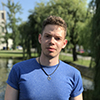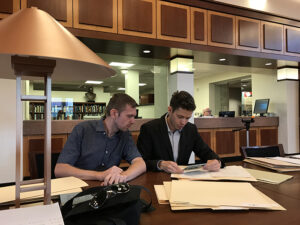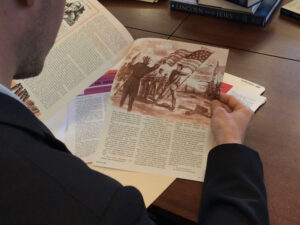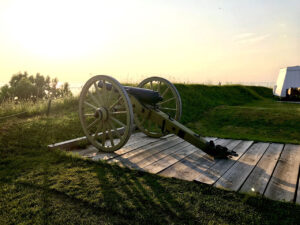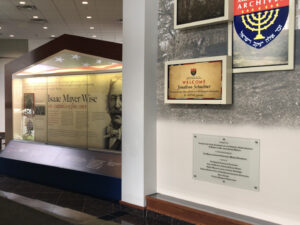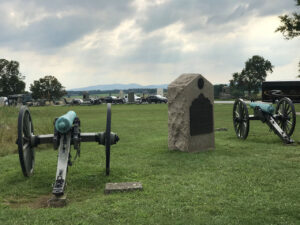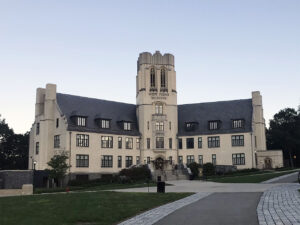Hi! We are Peter K. Rosenbluth and Peter Banyavari
Welcome to the behind the scenes of Jewish Documentaries project!
How it all started?
It all started one day in cold October 2016. Peter and I went to see the exhibition in the National Museum of Hungary in Budapest. During the exhibition, we started to talk about Hungarian Revolution in 1848. Thanks for Peter’s huge knowledge of history and previous researches, we realized that many Jewish revolutionaries fled to the USA. Their ideas were too advanced for Europe at that time. This realization made us dig deeper, and the more we research, we find more fascinating facts about that area.
One sunny day in November 2016, we were drinking coffee, and talking about the facts we find out. Then the idea of creating a documentary movie about European Jews who fled to the USA came to life.
We knew that we don’t want to make some boring documentary. We wanted to bring to life forgotten stories and visually help people to see how life looked at that time.
Together, we were searching for old photos, footage, stories and all the data that we could collect. Along our research we found many of fascinating and lost stories. After then we were working together with historians, consulting them to find out more. The biggest challenge was colorizing the photos and footage because we wanted to restore it to look exactly as original.
It was a long path, but we did it. Peter really made an amazing job from a technology and editing perspective. He is really talented with technology, and he knows his way around. I don’t think that we would be able to make it if it wasn’t for his skills. We made the first documentary on the Jews and 1848, and the first colorized movie on the Jews and the American Civil War.
Why Jews?
I was doing research on my family history. My family is having mysterious past which I started to investigate. I remembered that my grandma was telling me stories about her parents and their siblings and how something terrible happened to her aunt. She never told me what happened to her aunt, but she told me to always respect everyone and never judge anyone.
After my grandma died, in her apartment, I find with my mum lots of old papers. There were a lot of birth certificates, marriage certificates and one old envelope. In the envelope, there were 2 papers. One of the papers said that my grandma needed to change her Jewish family name when she was little. The other paper was an envelope that her aunt was in a camp. This discovery motivated me to find out more about Jews and Jewish culture.
Since I was a child, I was attracted to Jewish heritage. I was reading everything there is about Judaism and learning more and more every day about it. I knew I was from an assimilated family. One day, I decided to do a DNA test where I found plenty of cousins.
I learnt from my father’s first cousin that my grandma and great-grandparents were Holocaust survivors. My grandma died when my father was small, therefore we only learnt about it later. I also got documents about the deportation from the Jewish Community of Szeged. This has deeply touched me and firmed my identity even stronger. I am also a member of the Bet Orim Reform Jewish Community.
I’m following Judaism in every aspect of my life. Besides that, I’m still learning about the Jewish past and what can I learn from it to be a better person.
Why history?
Even though IT and programming are in my heart, history was always my mistress. I am a developer and web designer who is studying Egyptology at the University.
I love learning about what happened in the past and how it affected today’s life.
I think that my grandma gave me this love for history. When I was little, she was always telling me fascinating stories about history, and we watched a lot of documentary movies together.
I love history. It was my favorite subject in school and the only reason why I loved going to school. I am always looking for hidden gems of the history books.
I find it fascinating to learn about what happened in the world and why it is like this now. I combined my love of history and Judaism, and I spend the majority of my time researching the forgotten part of the Jewish history.
What this project means to me?
This project is dear to my heart because I can find forgotten stories and retell them to people. I love how we can bring old photos and videos to life and show people what the world looked like in the past. This way, we can all see the world of our ancestors differently and more colorfully.
This project is important to me because I can find out more things about my ancestors and what happened to them. I can see my religion from a different angle and how can I be a better Jew based on what happened in Jewish history.
What is my favorite part on this project?
My favorite part is restoring old photos and videos. I love seeing it in a color and how different it looked from being black and white. Besides that, I love finding out what happened in history and learning new facts about Jewish culture and Jewish history.
My favorite part is doing research on what happened to Jewish people in the past and connecting things to get the full story. I love to see when all of these stories appear on the screen in a form of a documentary movie.
What is next for Jewish documentary movies?
Many stories are being forgotten. In Europe, during the war, many Jewish people lost their lives in camps. Unfortunately, Auschwitz wasn’t the only camp where Jews were killed, and many of them are keeping forgotten stories.
Jewish history is long as humanity itself. During their history, they didn’t only have one major event – World War II. Jews have an intriguing history with lots of events and stories that need to be told. We have a few topics in mind that happened before the First and Second World Wars.
Take a sneak peek of how we are spending the breaks between shooting the interviews, doing research and movie editing


